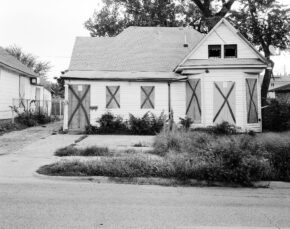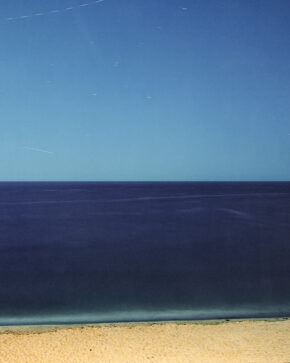Quite a few blogs have posted this story in Newsweek sensationally entitled “Is photography dead?” My take on the whole thing: A painter/art critic lashes out at photography for hogging all the gallery space with photos of photos, slick fashion spreads and editorial outtakes.
- Posted on
- By rhaggart
- In Photography Business


22 Comments
Absolutely APE — without the title this piece is DOA. Why is anyone surprised that photography, by means of new technology (and old), is breaking away from reality just as painting, sculpture, and early other medium has already through their own arcs and evolution? The most annoying part to me is the author’s suggestion that “truth” and “reality” (as its supposedly captured by photography before the digital revoluton) are one in the same. Impressive asshattery.
I had a similar reaction. After realizing that Plagens is a painter, I found myself wondering if he might just be worried that Painting Is Dead, now that photographers are doing so much more with their photos than they used to.
Bleh. We’ve just been suckered by a doomsday headline.
Besides, photography didn’t need the digital revolution to break away from reality. Photographers participated in abstract, minimalist, surreal and any number of other non-reality-based movements long before we had Photoshop.
The writer’s selective ‘facts’, and faulty premises seemed to destroy his own case. However, most who read it are not schooled in what we know. I would like to see his notes (and the notes from many who write such things) to see if he really didn’t understand or he understood too well and wrote it anyway.
In my dealings with the press (not so much lately, but back in the .COM boom I had a lot of them) most all were written poorly and few of the ‘reporters’ had a friggin clue what we were doing nor were they interested in finding out. They were simply interested in doing a ‘story.’
His scare tactic headline grabbed a ton of attention though. Hmmm… wait, maybe I’m seeing a pattern there. After all it is Newsweek.
“Impressive asshattery.” Yep, that sums it up for me.
What utter bilge and I wonder .. why was this poorly conceived piece even published?
The premise at the core of the writing is simply flawed (misconceived notion of objective “truth” in photography, huh?).. the author yearns for didactic truthiness in photography. S/he totally does not recognize the inherent subjectivity of our entire experience.
God, just writing in this like 3rd or 4th derivative about this sad diatribe is a waste of time for me and you.
I move from pity to astonishment at the affected naiveté to dismissal.
While the Newsweek article is a bit extreme, I do understand the frustration. I find no pleasure in, nor temptation towards manipulating images. That’s not why I picked up a camera rather than a paintbrush.
The comparison to CGI-heavy Hollywood stuff is apt. I can’t watch it. It does not look beautiful or awe-inspiring, and it does not impress me. Some people find it beautiful, but I think it’s horribly cheesy and instantly dated.
But there’s plenty of room for both takes on it, right? So long as no one on my team ever utters the words “you can just Photoshop that”, I’ll be ok.
I’m pretty sure painters said photography was dead back when people were still using wet plates.
Follow the money. That’s all you’ve got to do. Bill Hunt is a well-respected gallery owner, so you know there must be demand for this kind of imagery, if he’s showing it. (Whether it’s proper to show outtakes from editorial jobs, well, that’s another conversation entirely). But clearly, photography is more alive now than ever before. Even twenty years ago, it took a bank of eight enlargers for Uelsman to pull off those surreal images. (Don’t you know that he’s pissed off right now, with every Pratt kid using CS3 effortlessly, but that’s another conversation too).
But in terms of photography versus painting claiming gallery walls, again, follow the money. The marketplace dictates, always. I think the buying public for photography is getting younger and younger, and they’ve grown up on photography, MTV, magazines, and cell phones; their heroes might not be painters.
Yeah, the photography market might be tough, but compared to painting, as a way to make a living, I’m putting my 500 shares of Apple Computer on photographers.
I read that article through twice, and didn’t remember a thing from it either time. I got more juice out of the comments in the blog here.
As far as I’m concerned, modern painters ought to be thankful that photography was invented, far from being the death of painting it created the entire modern art movement. Prior to that painters were the equivalent of your local family portrait guy. Once that job was taken over by photography, painting was free.
Of course, painters were then free to starve to death but eventually the work of Van Gogh et al made a lot of money for collectors.
Then you got the death of professional photography when Mr. Eastman invented the Brownie and portraiture became home snapshots.
Then it died when autofocus and autoexposure showed up on 35mm cameras.
Then it died when digital imaging showed up.
Then when microstock showed up…
Of course I’m sure I missed a lot of other deaths in there.
Kim Taylor
Dear Richard Prince:
Photos of photographs that I didn’t take – brilliant – why didn’t I think of that?
Lemme tell ya, the only thing that’s on its deathbed is Newsweek’s circulation (and credibility).
As with many criticisms, that author seems desperate to put some outline around a creative medium, as if to say: “This is what photography is. Outside of here is no good.”
Photography is a language, just like music or the written word. The author seems to think it owes him some sort of truth, but all it owes any of us is a method of communication unique to its medium.
I find it ironic that the article is sponsored by Kodak… Mama don’t take my Kodachrome away…
When photography started to become popular at the end of the 19th Century, many people cried that Painting was Dead. But the opposite happened. Photography liberated the painter, who didn’t have to try to capture life as it was. That’s what photography was for. A whole bunch of isms were born: Impressionism, Expressionism, Dadaism, Cubism, Hyper-realism…
Photoshop and digital photography have the power to bring more people into the creative industry, creating a new field. Productions that took days can be made in Photoshop in hours. Some of the mundane photographer’s responsibilities are gone, thus liberating the photographer to do what he loves, to follow his vision.
By definition photography is dead.
Photography is currently the darling of the modern art world. It won’t always be, and it wasn’t before.
Just because someone wants photography to be dead doesn’t make it so. It’s pretty much nonsense. Anyone who is currently investing in photography is unlikely to be swayed by this article. Anyone who is swayed wasn’t going to be spending much money on photography anyway. I don’t think this piece accomplishes much, except to allow the writer to feel a little better.
to anyone interested in reading the thoughts of someone really worth listening to on this same subject I suggest getting a hold of the book In Our Own Image by NYU Tisch School professor and former NY Times Magazine picture editor Fred Ritchin. Better yet, go and hear him speak in person if ever you have the chance.
“Impressive asshattery.”
There is a lot of that going on lately it would appear.
I can see where the Newsweek article is coming from, but I think there is more emotion driving the piece than the journalist might want to admit to his reading audience or himself. The article seemed to lose objectivity to the highest degree when he was complaining about computer effects in cinema. Plagens attacks an obvious target, Robert Zemeckis’ new “Beowulf” film, a pageant of sensation more akin to a roller coaster ride than a Monet, but he failed to mention the computer-generated feather and other digital techniques seen in another Zemeckis film, “Forrest Gump,” which was, I would say, indisputably the invention of intelligent artists whose work deserves to be seen. He has failed to examine and give credence to the flip side of the coin. This is an opinion piece badly cloaked as journalism.
The Newsweek article is one of those pieces that most likely had the provocative headline before it was written. Pretty lame, but it does bring up something about the photo world that I think needs to be discussed. Not unlike the earlier “is photography art” question, it is now “what is photography”?
In the film days photographers would choose a film stock that would help them best express what they were trying to convey – be it commercial, fine art, or documentary. The film had limitations and parameters. The more creative of us would push the limitations of the film in hopes of finding a new or original use for it. With the advent of digital, those parameters are pretty much wide open. It only makes sense that photographers would start push it beyond “the moment” as it is so easy to do now. This is not a new concept, Man Ray did it, as did Jerry Uelsmann, and Pete Tuner in the commercial world. It is just more accessible now. I would argue though that to be a photographer is to capture a specific moment in time. Danny Lyon caught the biker crossing the Ohio, Bert Stern caught Marilyn, Avedon caught Charlie Chaplin, Adams caught the Moonrise. Any of these shots could be recreated but what makes them special is that each happened at specific moment in time. They are “true” in that the photographer was there at that moment. But, as we know, photo “truth” is subjective. Light, lens, camera, film, positioning, background make them the photographer’s personal versions of the truth.
The digital compositing that is becoming ubiquitous today is not photography, it is illustration made to look like photography. This is not a criticism of illustration or of photography. I think that the practice is ahead of the vernacular. In the commercial world it doesn’t really matter what you call it, all that is needed is arresting imagery to sell products. In the art world digital composites should be called photo illustration. In the documentary world truth is essential. The viewpoint may be subjective but there was a moment in time, an event when the shutter was pushed – that is the truth.
I have no problem composing a shot with multiple sources but it is not a photograph, even if it looks like one. It is an illustration, a composite, a collage. We will always search for a “brand new way” of making photographs and as long as we remain “in the moment” that is exactly what we will be doing.
Nicely put, Darrell. :)
Now, can someone define “dead” for me?
the first 1/3rd of his article, i agree and there have been many evenings where i’m surrounded by photographers who keep repeating, “we need to get back to basics.” The authors closing remarks revealed one vital truth that will ring true for generations upon generations of great photographers to come. There are people in this world who are born to make photographs and there are some who will only talk about them. Sometimes writers make it too easy to spotlight their ignorance.
[…] 最近比较热闹的话题应该是新闻周刊(Newsweek)上的文章摄影已死?(Is Photography Dead?),尽管这篇文章颇显激进、片面(这也是我之前一直懒得提这篇文章的原因),但这篇在摄影圈子里面掀起的轩然大波却是始料未及的。喜欢看中文的同志们欢迎光临莱卡中文网,喜欢看英文的同志们可以继续往下看。首先值得一看的便是文章后面紧跟的评论;接下来是大众摄影的博客文章,题目我非常喜欢《摄影又挂了,这次是新闻周刊说的(Photography is Dead Again, Says Newsweek)》,连线杂志也在他们的博客上迅速回应了一个简短的观点。博客一个图片编辑也贴出了自己的观点,简单的一句话:我觉得整件事情就是一个搞艺术批评的在几个挂满了抄袭作品、杂志封面和图片编辑们都看不上眼的作品画廊里面转了一圈以后对摄影大发厥词。另外Adobe的资深约翰·莱克(John Nack)也憋不住在自己的博客上发表了自己的观点。不过最有趣的还是这一篇文章,《摄影才没死,摄影现在值钱着呢(Photography is not dead …photography is worth a million dollars)》。 […]
Comments are closed for this article!